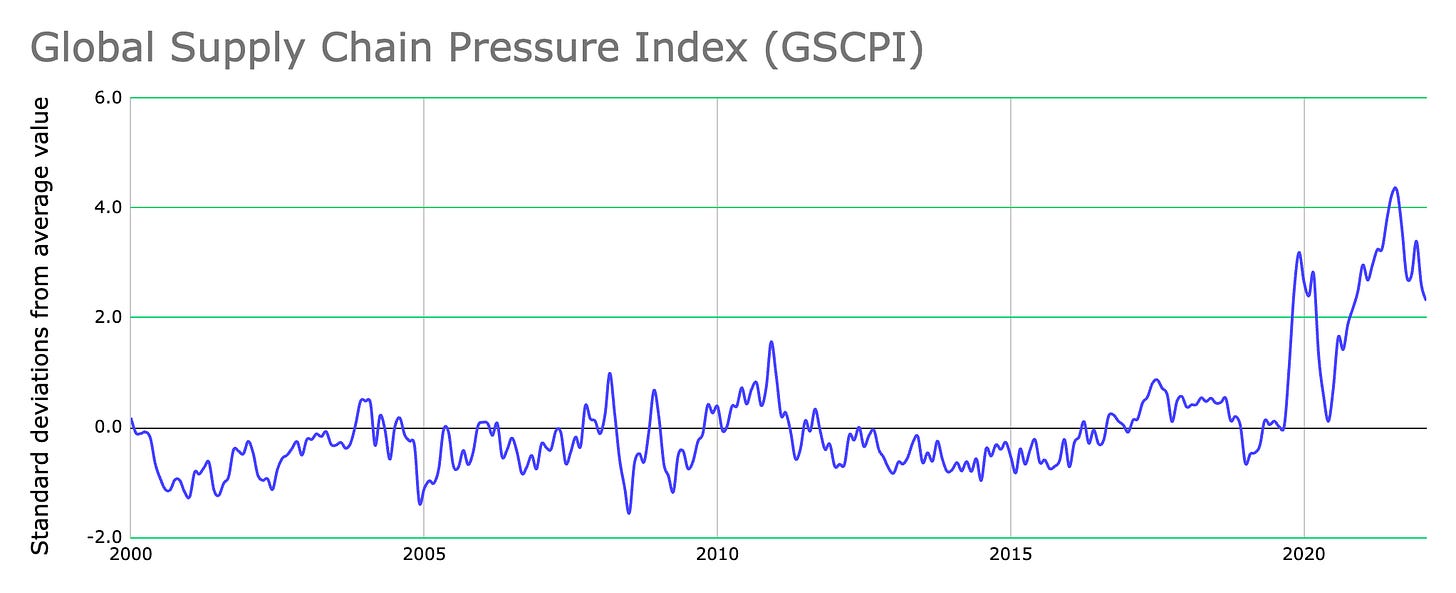Open Office Hours for Supply Chain and Logistics Startups
Book a time using the link in the last paragraph!
We’ve all experienced supply chain disruptions over the past couple of years. First, it was the pandemic-induced toilet paper shortage. Then, computer chip shortages led to fewer new cars being produced. Used car prices reached all-time highs. Lumber, cream cheese, and baby formula shortages came and went. The New York Fed’s Global Supply Chain Pressure Index has never been higher.
Source: New York Fed
JP Morgan cites the Russia-Ukraine Conflict and Covid-19 lockdowns in China as major contributors. This summer has also seen increasingly extreme weather throwing another wrench into our fragile global supply chain. Massive heatwaves in China are prompting factory shutdowns and rolling blackouts. In Germany, the Rhine River’s water levels are so low that transporting vital goods through it may become difficult.
While some pressures like Covid-19 lockdowns will eventually abate, trends like climate change and extreme weather will persist. New supply chain pressures will also inevitably arise.
Every decision maker across the supply chain and logistics industry recognizes these challenges and is responding in many ways. New technology and business processes are helping to soften the impact of some of these challenges, but the pace of adoption is still behind many other industries.
The need for supply chain transparency, resilience, and sustainability has given a boost to many startups in this space. We’ve seen a number of our portfolio companies rise to these new challenges. For example, Tive recently introduced the Tive Tag to better optimize cold chain shipments. Nuvocargo is bolstering trade at the US-Mexico border to offset challenges in other routes in our supply chain. The 2010s allowed tech unicorns like Flexport, Convoy, and Project44 to flourish. No doubt, the 2020s will see a new generation of supply chain and logistics heavyweights emerge.
Our interest in this sector stems not only from the tremendous impact it has on our day-to-day lives, but also arises from our focus on immigrant founders. Immigrant founders are uniquely positioned to tackle supply chain and logistics challenges. Many of these founders grew up learning about cross-border trade, customs, exchange rates, etc. They have networks that span multiple countries and understand what it takes to move goods across borders. Immigrants also contribute disproportionately to our supply chain and logistics workforce. They make up nearly 19% of US truck drivers, and we’ll need more of them to meet future demand.
I'd love to chat if you’re a founder solving supply chain and logistics challenges at the pre-seed/seed stage. I’ll be holding open office hours and you can grab a time here. Even if you’re not an immigrant, I can direct you to one of the many funds that we like to work with.



